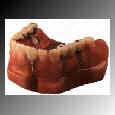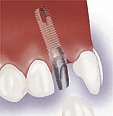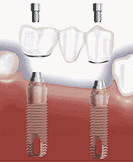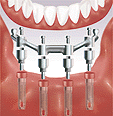|
What are dental
implants?
Dental implants are precisely
manufactured substitute tooth roots usually made from
titanium or its alloy resembling
screws, which actually bond with the living bone structure of the jaw.
Dental Implants have been around for many years. Developed in the
60's they have evolved into the present day implant.
- Prosthetic crowns fastened
with machined screws are placed on top of the implant to replicate the
missing teeth.
- Prosthetic options include
single crowns (caps), bridgework or an implant retained overdenture.
Figure 1

An
example of how an implant is used to replace a missing tooth. The
implant actually only replaces the root of the tooth. A crown is
then placed on the implant. |
Figure 2

This
model shows the versatility of dental implants. They can be used
virtually anywhere in the mouth for the replacement of one or all of
your teeth. |
Are Dental
Implants a good choice for me?
In all of these instances, dental
implants can help:
- A person missing a tooth, or
teeth, can be an ideal candidate for implants, especially when your
smile reveals missing teeth!
- Also, if you are
uncomfortable with the way your dentures fit.
- Loose dentures are causing
sore gums because of friction or food trapped under the bridgework.
- Perhaps loose teeth from gum
disease need support.
Dental implants can give you a
new base to support new teeth that function and feel like natural
teeth.
When are dental
implants best advised?
Especially in a visible area in
front, or where a missing tooth may best be replaced with a supportive
tooth required for a bridge.
- Replacement of a single
tooth.
- Replacement of multiple
teeth.
- Replacement of the entire
dental arch.
Are your
dentures loose and your gums sore?
Without teeth, the jawbone looses
mass over time. Without a solid base, loose dentures have a tendency to
irritate the gums... causing pain and sores while trapping food under the
denture.
- Implants combined with clips
or attachments can make them fit tight.
- Refitting or replacing your
dentures may work for a short while,
- however this in not a
long-term solution.
Will it hurt?
We administer gentle treatment of
the bone by the surgeon to ensure successful treatments. Discomfort is
held to a minimum, as your comfort and safety is our greatest concern!
Is it
expensive?
Relatively speaking, for the
long-term medical and aesthetic values, the cost is low. Your trip to
Costa Rica will virtually be paid for by the very affordable treatment
available here at the Dental Wellness Clinic.
Number of
implants needed ?
Ideally one implant per missing tooth, but it depends on
the type of bridge.
What if I am missing several
teeth ?
Depending on your specific needs, your dentist could offer
you diferent options like fixed, fixed-removable or removable
bridges.
What if I have no teeth ?
According to the quality and volume of your bone you can
have different types of theet:
- FIXED - Removed periodically by your dentist.
- REMOVABLE - Easy access for hygiene. The implants under
it secure the bridge in place
- FIXED REMOVABLE - Works like fixed with the easy access
for hygiene.
I like my dentures, but they
move ?
Implants can be used as retention for your existing
dentures, eliminating movility and improving your chewing
ability.
When should I start this
treatment ?
As soon as you loose a tooth, otherwise the bone starts
shrinking.
What if I have gum disease ?
It will need to be
controled, and remove teeth with poor
prognosis before placing the implants, improving your
esthetics and function.
How long will they work ?
For life, as long as you maintain a healthy mouth, that is
way we recomend periodic cleaning.
Are implants difficult to
clean ?
No more difficult than your original teeth.
Will others know I have
dental implants ?
Today's implant treatment enables you to have your new
teeth look, feel and function like your own. Even though
others will be unaware you have dental implants, many patients
are so pleased they tell everyone they know.
|
How
can implants be used to replace teeth?
|
|
This is
an example of how our office uses a single tooth implant to
replace a missing tooth. The biggest advantage of this type of treatment is that the
adjacent teeth do not need to be cut down to support a bridge.
Implant acts as the root of the tooth and when the final crown is
placed, it gives you a fully functional replacement of your
missing teeth. Single tooth implants can be placed anywhere in the
mouth as far back as the 2nd molar region.
tooth. The biggest advantage of this type of treatment is that the
adjacent teeth do not need to be cut down to support a bridge.
Implant acts as the root of the tooth and when the final crown is
placed, it gives you a fully functional replacement of your
missing teeth. Single tooth implants can be placed anywhere in the
mouth as far back as the 2nd molar region.

We can also place multiple implants and a bridge on top of the
implants. The traditional alternative to this treatment, a
removable partial denture, can be completely avoided. This
treatment is perfect for the anterior or posterior portion of the
mouth. The advantage over a partial denture is the implant bridge
stays in the mouth and cannot be removed, just like your natural
teeth. Also it does not cause unnecessary damage to the other
teeth in the mouth the way a partial denture does.

If you are currently wearing dentures, implants can dramatically
change your life. We can either eliminate your denture or give it
an incredible amount of retention. The implant acts a root
allowing the dentist to snap the denture onto the implants. To the
left you can see a typical over denture. The bar is screwed into
the implants. The denture has special clips processed into its
base that snap on the bar. This gives you a denture that does not
move in the mouth.
|
Dental implants are a
remarkable discovery in dentistry. They allow us to predictably replace
missing teeth in patients. Now people who have been wearing partials and
dentures can get rid of these cumbersome items and have teeth that stay
permanently in the mouth.
Even if your are missing a
single tooth, implants can help you avoid cutting down healthy teeth to
place a bridge.
Whether you are missing one
or all of your teeth, implants can be used to give you back a natural and
strong bite.
Dental implants are a miracle
according to some of our patients. Call our office to see how dental
implants can benefit you.
I have
cavities and missing teeth. Can I still have Implants placed?
Before any
Implants can be placed, the mouth must be free of any disease. Meaning
that any cavities or periodontal disease must be taken care or prior to
implant placement. Failure to do so can jeopardize the health and
longevity of the implants. Once all disease is under control, Implant
placement can proceed.
Who can have
Dental Implants Placed?
Basically, anyone who is
healthy enough to undergo minor surgery can be a candidate for dental
implant surgery. The only people who are unfit to undergo implant surgery
are uncontrolled diabetics and smokers. Almost all other medical
conditions can be managed.
I smoke. Can
I still have implants placed?
Smoking greatly reduces the
integration rate of dental implants, meaning that the bone fails to grow
into the implants. This can cause not only infection and loss of the
implant, but can damage the bone so as to prevent future implant placement
in case the patient ever decides to stop smoking.
What if my
implant fails to integrate into the bone?
Currently the success rate of dental implants is around 95-97%. Yes
there is a small risk that the implant will fail to integrate, but we do
everything in our office to ensure that the patient undergoes an
uneventful surgery with successful implant placement and integration. If
unsuccessful integration occurs, the area in the jawbone is cleaned out
and allowed to heal and a new implant is placed a few weeks later.
Will my
Dental Implant last forever?
That is an unfair question.
Just as you have lost your natural teeth, there is a chance that you may
lose your implant. However, currently there is a 95% success rate for
implants after 10 years. This means that if 100 implants are placed in 100
patients, 95 will still have functioning implants after a decade. I lost
my teeth to cavities and periodontal disease.
Now that I
have Implants I never have to worry about going to the dentist again.
Right?
Nothing could be further from the truth. Although it is true that the
implant cannot decay like a natural tooth, It is still susceptible to
infection that can destroy the supporting bone. Therefore it is imperative
to get regular follow-ups and preventive care to make sure your implants
have a long and healthy life.
What
exactly is the procedure and how long does it take?
There
are several steps involved in the placement of a dental implant. They will
be briefly outlined for you below. The first step is to do a complete and
thorough exam on the patient. All appropriate records will be taken at
this time. The doctor will then go through the records and determine if
you are a candidate for dental implants and what type of final restoration
is appropriate. The second step is the case presentation where the doctor
will inform you of all treatment options and costs involved. At this time
a surgery date will be scheduled. The day of the surgery, wear loose
comfortable clothing. Arrive 1/2 hour early to that any last minute
instructions can be given. You will be led into the surgical room and
anesthetized. The Implant placement will last anywhere from 1/2 to 1
1/2hours depending on the complexity of the case. On a later date a second
minor surgery is performed. At this appointment a small incision is made
in the gum tissue to uncover the implant. Once the implant is exposed, an
Abutment is placed on the implant. The abutment is the portion of the
implant onto which the final crown is placed. After placement of the
abutment, a temporary crown is placed on it. This allows the tissue to
heal around the implant. After the tissue is healed, an impression is
taken and sent to the lab for fabrication of the final crown. The crown is
then cemented.
see: Dental
Implant
| ![]()